Grow these 15 herbs for chickens near the chicken coop. They will improve immunity, keep them parasite free, reduce their stress, and prevent boredom. Healthy, happy chickens lay more eggs. Growing herbs is a simple and economical way to keep your backyard flock healthy and productive.
Benefits of Growing Herbs for Chickens
Herbs are easy to grow in most climates. They don’t require extra fertilization and are adaptable to most soil types. Herbs are also a natural part of chicken diets. When given the opportunity to free-range in the herb garden, chickens will naturally choose exactly the herbs they require to stay healthy.
Herbs offer additional vitamins and minerals, including trace minerals that may not be included in commercial layer and brooder feed mixes.
Herbs that are thriving in your garden are stressed by exactly the same stressors that your chickens are stressed by. These herbs have adapted to the stressors and contain the exact constituents that will help your chickens thrive. The same herbs can alsohelp ducks, and other poultry.
Farm animals will naturally self medicate when given the chance to choose their own food and medicine from a bountiful garden.
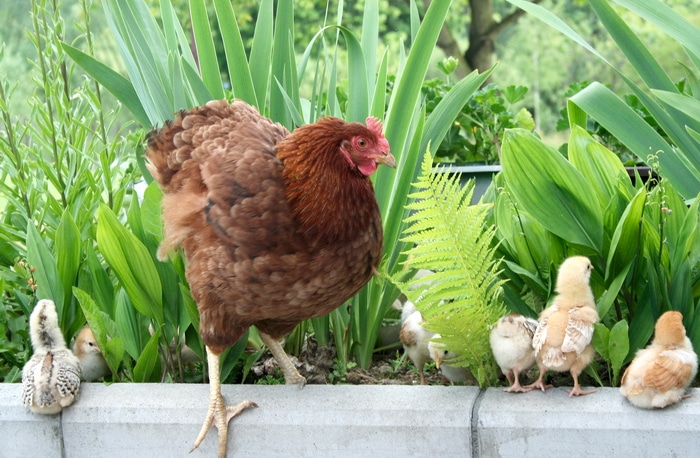
Perennial Herbs for Backyard Chickens
Perennial herbs grow bigger and bushier every year. They can be divided in early spring every couple of years to create new plants. Once you have a start of these hardy perennials you’ll be able to maintain a constant supply of leaves, flowers, and roots to use in chicken care or to bring into your home for your own family.
I start my perennials in their own bed in the garden. Once they are well established and need to be divided, I move a few starts to the perimeter of my chicken yard, just outside the fence. As these plants grow, the chickens will prune them through the chicken wire fence. The hens won’t be able to scratch up the entire plants though. In this way, if the chickens are too vigorous in their pruning, I still have the mother perennial plants to draw from in the future.
Here are some perennials that can help you chickens resist parasites like lice, mites, and other insect pests. Add powdered dried herbs to their dust bath so that the aromatic volatile oils make direct contact with pests and keep the chickens inhospitable to parasites. These herbs also have insect repellent actions that can help to keep flies away from the chicken coop although its also important to use deep bedding or keep the coop cleaned up regularly.
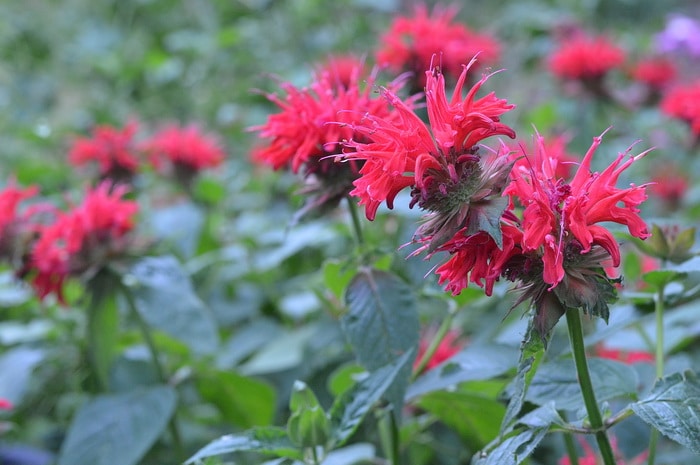
As chickens help themselves to the herbs they also increase their immune systems and respiratory health, strengthening them against respiratory infections, infectious bronchitis, and avian flu,
- Yarrow
- Oregano, natural antibiotic
- Thyme, natural antibiotic
- Lemon Balm
- Comfrey
- Rosemary
- Plantain Leaf
- Sage
- Bee Balm or Monarda, natural antibiotic
- Spearmint, stimulates egg laying
- Peppermint
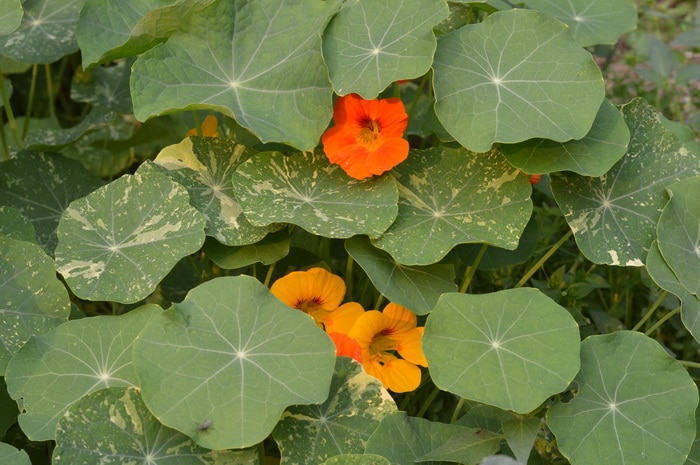
Annual Herbs for Chickens
These annual herbs and flowers are just as beneficial for chickens as they are for humans. Aromatic and high in antioxidants these can be planted just outside the perimeter of the chicken fence so that your chickens can help themselves without disturbing the roots. Herbs like calendula, marigold, and parsley improve the depth of color in the egg yolks, which you’ll especially notice in your fresh eggs. Strongly aromatic herbs like garlic and nasturtium improve blood circulation and blood vessel development.
- Chamomile, calming and helps to keep the yolks yellow
- Basil
- Calendula or Marigolds, makes the yolks richer — high in carotenoids, repels bugs
- Dill
- Nasturtium
- Garlic — antibiotic, antimicrobial, antiparasitic
- Parsley
- Fennel
- Chickweed — rich in minerals and a blood builder
- Stinging nettles — mineral rich, replenishes the building blocks for nerves, blood, and liver, reduces stress
Research has found that garlic is an effective treatment for chickens against many bacteria, including Salmonella and Escherichia coli (e-coli). The use of garlic in scientific studies with broiler chicks prevented illenss. (Source)
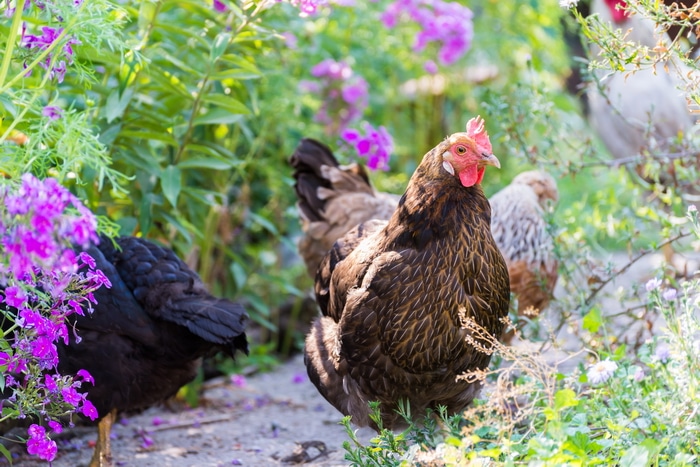
Remember to plant shade herbs
Rose bushes, tall comfrey plants, mulberry bushes, hop vines, can all provide shade in hot weather as well as moisture and areas for worms to congregate. Chickens love the extra protein and amusement scratching for worms provides. Scratching satisfies the dopamine response and is a stress reliever, so the more opportunities for healthy, rewarding scratching you can provide will make your hens happier. When these shrubs and perennials are medicinal herbs you won’t have to worry about rodents in the chicken run. Rodents are repelled by strongly aromatic herbs like spearmint and peppermint.
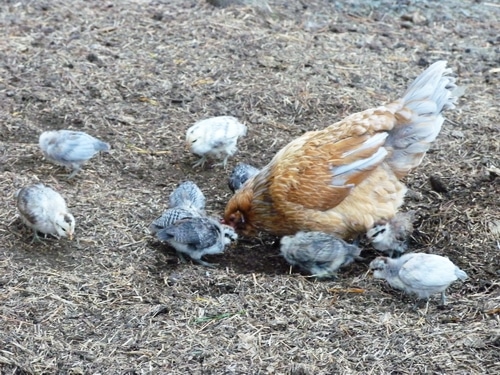
5 Ways to Use Herbs for Chickens
Allow chickens to free-range near the herb garden
Chickens, like all farm animals, will self medicate when they are allowed to free-range among a varied and thriving herb garden. Protect annual herbs and flowers from scratching hens but plant a few close to the chicken fence where the hens can reach just the tops through the wire.
Nest Box Strewing Herbs
In the Homesteader’s Herbal Companion, The Ultimate Guide to Growing, Preserving, and Using Herbs, Amy Fewell suggests using fresh herbs in the summer, when they are abundant, and dried herbs in the off-seasons to keep nesting boxes pest-free, clean, and fragrant. Place a large handful of the herbs right in the nesting boxes with the straw you normally line the nesting boxes with. Consider foraging for these 10 Medicinal Herbs in the Fall until you get your herb garden established.
Any fragrant and abundant herb will work well, but try a combination of any of the above herbs if you have them growing. They are anti-parasitic and act as a laying stimulant, attracting the hens to the boxes.
Bundling herbs and hanging them in bunches in the coop is also effective. The hens will peck at them periodically throughout the day. It serves to minimize boredom while it gives them a healthy boost during seasonal molts, rainy weather, and other stressors.
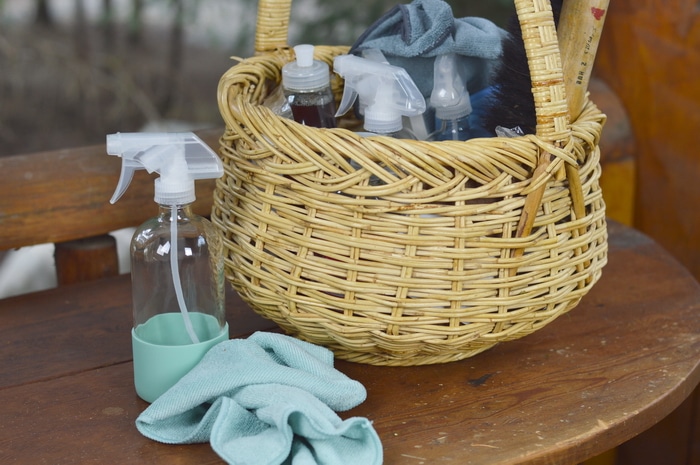
Coop Disinfectant and Cleaner
Many of the herbs in our list of herbs for chickens are antimicrobial and antiseptic, making them very useful to add to natural cleaning solutions for the coop and nest boxes.
Recipe: Coop Disinfectant and Cleaner
Use this natural antiseptic herbal spray cleaner to clean and disinfect the chicken coop. Use it in a glass spray bottle for efficiency.
Ingredients:
- 1 cup chopped mint leaves
- 1/4 cup lavender or rosemary leaves and flowers
- 2 tablespoons thyme leaves
- Peels from 3 oranges or lemons
- 1 1/2 cups vodka
- 1 1/2 cups distilled white vinegar
Directions:
- Combine the herbs and peels in a one-quart mason jar.
- Cover the herbs completely with vinegar and vodka.
- Allow this mixture to macerate for 2 to 4 weeks. Strain this into a new glass jar.
- When you are ready to use it put its full strength into a glass spray bottle.
- Spray the surfaces in your coop and wipe clean to both clean and disinfect.
Notes:
This herbal barn and coop cleaner is adapted from The Homesteader’s Herbal Companion, by Amy Fewell. Making it is very similar to making a tincture, so if you’ve already made a few tinctures the technique will be familiar to you.
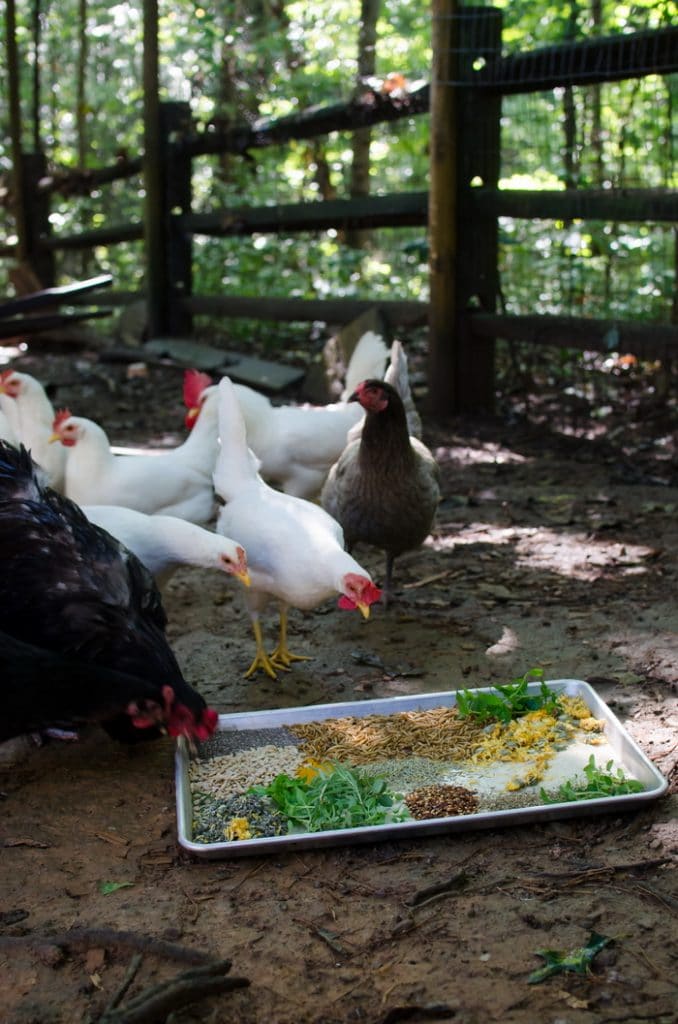
Copyright Amy Fewell, The Homesteaders Herbal Companion, 2018 (used with permission)
Herb Supplements in Food
Add dried herbs to your poultry food at a rate of no more than 10 to 15% of the feed or serve fresh herbs in bundles hanging in the chicken run. Using herbs for chickens as a nutritive boost and preventative helps to strengthen your hens during seasonal molts, hot weather stress, and wet weather. Herbs also provide extra calcium, though not enough to replace the oyster shell or egg shell supplement you provide.
Herbal Medicine for Chickens
When you need to treat all your chickens because of a health challenge you can infuse herbs directly into their water. Either add the herbs directly to the waterer or make a strong tea using medicinal herbs and fill the waterer with the herbal tea, diluting it with additional water to the fill line.
Herbal Salve for Wound Care and to Stop Pecking
Use yarrow/calendula salve for wound care in hens. It stops bleeding and encourages the mending of tissue. To stop pecking use cayenne salve, which also stops bleeding but encourages the other hens to stop pecking as well.
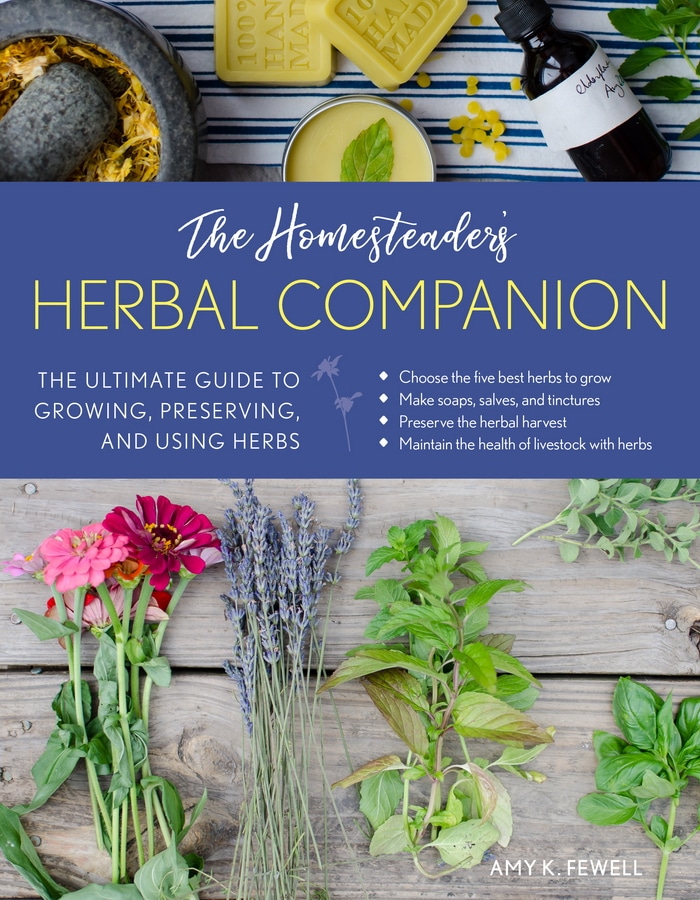
The Homesteader’s Herbal Companion by Amy Fewell
This book is filled with rock-solid information about growing and using herbs on the homestead in cooking, in medicine making, in the garden, and in the barnyard.
When we learn how to incorporate herbs in our lives, we can eliminate many things within our homes that are filled with chemicals and unnatural ingredients. We can create our own household cleaners, and save money while doing so. We can create our own chicken coop and barn cleaners, household air fresheners, cattle fly spray, pest deterrents, and more. — Amy Fewell
The book begins by laying out the basic information that everyone needs to use herbs effectively and safely. You’ll learn:
- The difference between tonic herbs and medicinal herbs
- How to determine safe dosages or serving sizes
- How to measure a safe dosage for infants and children
- What herbs to use with caution with the elderly
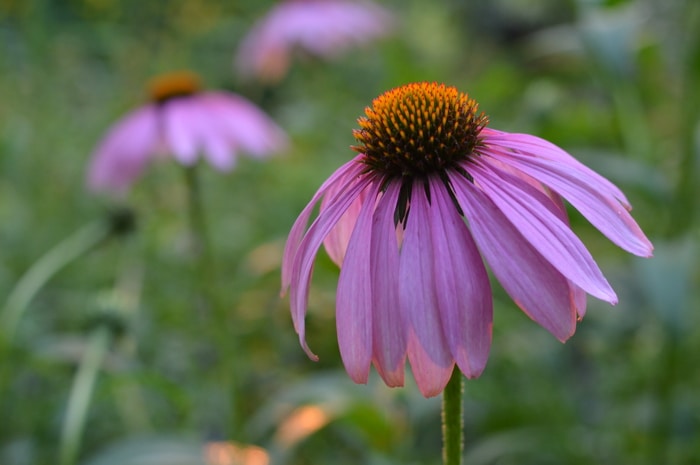
Then rather than overwhelm you with a list of hundreds of herbs, the author gives you a short materia medica with just the top picks in a Homesteader’s Herb List of the top 30 or so herbs that might be already growing in the wild around your homestead or would be easy to grow. Herbs like arnica, astragalus, basil, and many of the herbs I listed above as ideal herbs for chickens are included in the Materia medica. There are more than 30 herbs all together in the book but the herbs are not presented all at once, so there is no overwhelm in learning and applying the information gained.
Then Amy teaches you how to create an herb garden, how to forage for herbs in the wild, and how to identify wild herbs based on their characteristics. You’ll also learn how to effectively harvest and preserve the herbs you are growing and how to use them in cooking and medicine making.
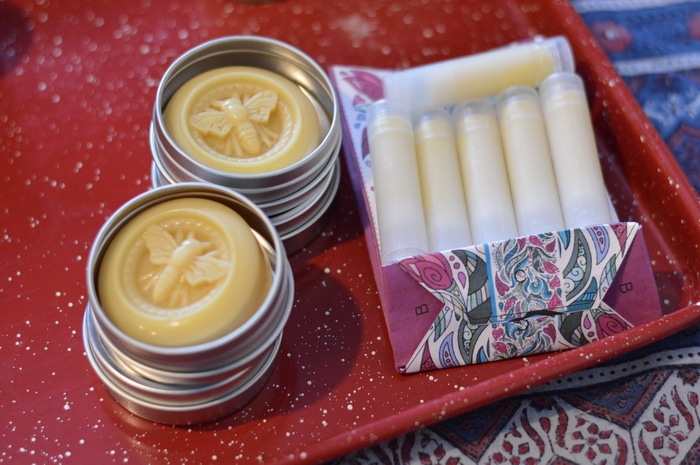
The book contains the basic herbal remedies that most homestead herbalists rely on like calendula salve, elderberry syrup, black drawing salve, headache relief salve, herbal lip balm, bath salts, tooth powder, and deodorant. But the book goes deeper by adding the kind of herbal solutions every homesteader needs in the barnyard, with farm dogs, poultry, and honeybees. This section has some essential recipes that will increase your DIY confidence and give you real freedom in your self-sufficient homestead. Amy also includes using essential oils on the homestead and incorporates essential oils in many of her recipes.
A few things I wish the book had more of. Amy leaves out the barn cats in her discussion of using herbs for animals. Please don’t take the recipes that are tested and proven effective for dogs and use them on your cats. Cats have different metabolisms than dogs. The caution is especially true for any remedy that includes essential oils.
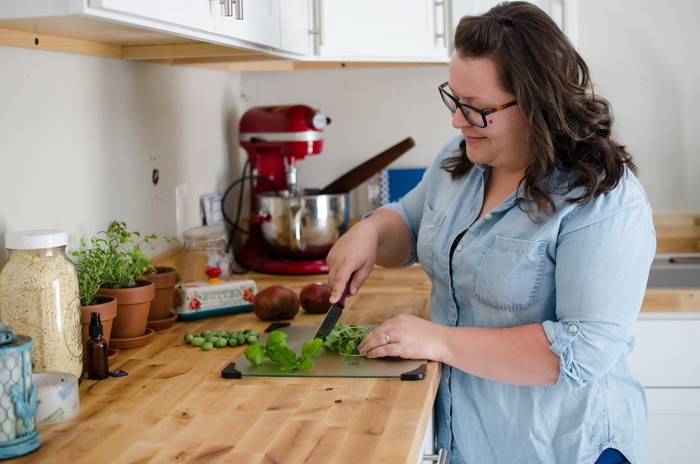
The author, Amy Fewell is an experienced homesteader who raises a large portion of her own food, medicine, and sundries on her homestead in the Blue Ridge Mountains. Amy is the founder of the Homesteaders of America. You can find Amy on her blog thefewellhomestead.com
Who is this book for?
This book has much to offer those who want to grow and use herbs on their own homestead. It gives them the basic information about growing and using herbal remedies, along with tested recipes to guide them in their own experiments with herbal remedies and culinary herbs. It offers the basic information a homesteader needs to grow their own, something many herbal books are missing. But it is an introduction to growing and using medicinal herbs on the homestead.
One of the strong points in this work is the projects for the chicken coop and barn using dried and fresh herbs and essential oils. Most herb books do no cover herbal remedies or essential oil use with animals. Further, many herb books are simply lists of herbs with their herbal actions and energetics. Amy’s book offers recipes as well, some by weight and some by volume measure.
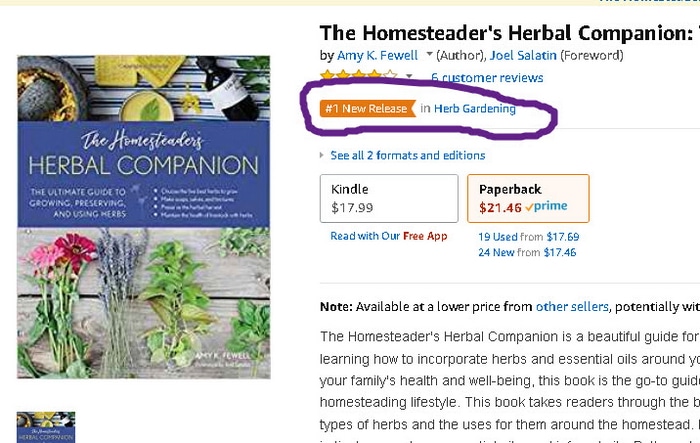
If you are at the beginning or intermediate stage in your homestead journey or your herbal journey, this book has what you need to save money and gain the freedom and confidence of using herbal remedies and essential oils with your own family and with your livestock and pets. But if you are at the experienced or expert level in homesteading or herbalism, already raising all your own food, living off-grid, and confidently making effective herbal remedies for your livestock, your own family, and others in your community, you may feel underwhelmed with this book. If that’s you please start writing your book. The world needs it.
But if you are longing to grow free medicine in your own back yard and use it with your own chickens. This is your book!
Disclosure: I received an advanced reading copy of this book from the publisher for the purpose of giving an honest review of the work.


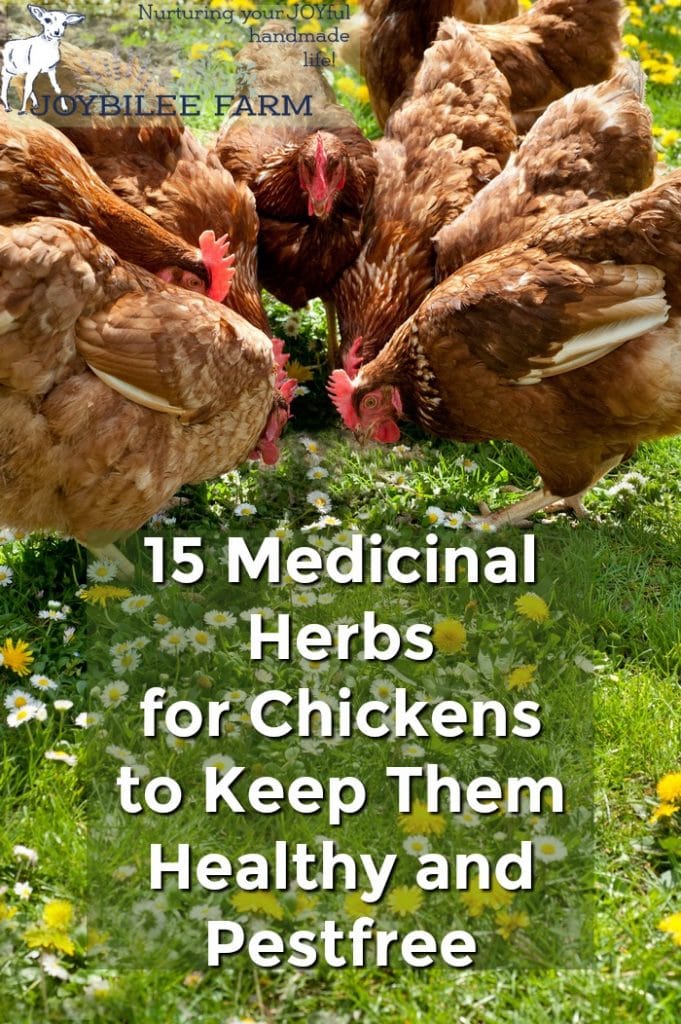


I love this! So informative. I have my list to get started.
thanks for advice keep-up
Probiotics
I have a question about the “Plantain Leaf” listed in the Perennials. I’ve been planting the herbs in the chicken run with the tops to rabbit cages over them so when they grow outside the cage, the chickens can have them. Plantain grows all over my property. Is there a reason it’s the leaf & not the whole plant?
Thanks,